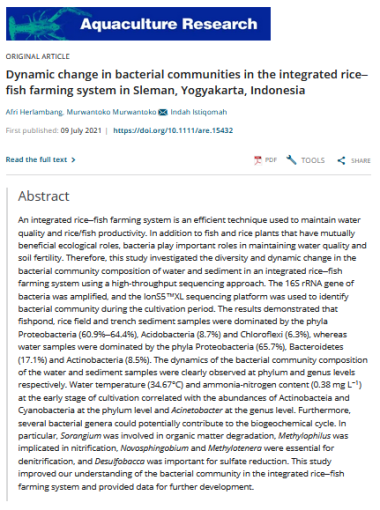
| Judul/Title |
Dynamic change in bacterial communities in the integrated rice–fish farming system in Sleman, Yogyakarta, Indonesia
|
| Penulis/Author | Afri Herlambang, Murwantoko Murwantoko, Indah Istiqomah |
| Tanggal/Date | 2021 |
| Abstrak/Abstract | An integrated rice–fish farming system is an efficient technique used to maintain water quality and rice/fish productivity. In addition to fish and rice plants that have mutually beneficial ecological roles, bacteria play important roles in maintaining water quality and soil fertility. Therefore, this study investigated the diversity and dynamic change in the bacterial community composition of water and sediment in an integrated rice–fish farming system using a high-throughput sequencing approach. The 16S rRNA gene of bacteria was amplified, and the IonS5™XL sequencing platform was used to identify bacterial community during the cultivation period. The results demonstrated that fishpond, rice field and trench sediment samples were dominated by the phyla Proteobacteria (60.9%–64.4%), Acidobacteria (8.7%) and Chloroflexi (6.3%), whereas water samples were dominated by the phyla Proteobacteria (65.7%), Bacteroidetes (17.1%) and Actinobacteria (8.5%). The dynamics of the bacterial community composition of the water and sediment samples were clearly observed at phylum and genus levels respectively. Water temperature (34.67°C) and ammonia-nitrogen content (0.38 mg L−1) at the early stage of cultivation correlated with the abundances of Actinobacteia and Cyanobacteria at the phylum level and Acinetobacter at the genus level. Furthermore, several bacterial genera could potentially contribute to the biogeochemical cycle. In particular, Sorangium was involved in organic matter degradation, Methylophilus was implicated in nitrification, Novosphingobium and Methylotenera were essential for denitrification, and Desulfobacca was important for sulfate reduction. This study improved our understanding of the bacterial community in the integrated rice–fish farming system and provided data for further development. |
https://doi.org/10.1111/are.15432


